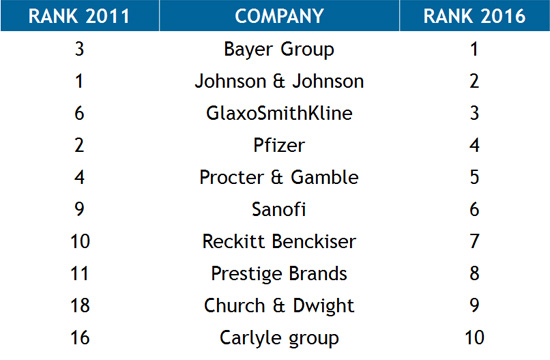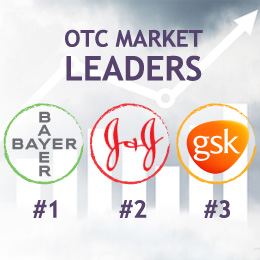The top six branded OTC marketers in the United States hold 37% of the total market, and many of these companies have grown as a result of consolidation and acquisitions over the past five years.
Bayer’s acquisition of Merck’s consumer health unit bolstered its position from #3 in 2011 to now being the #1 marketer in the United States. GlaxoSmithKline’s rank improved from #6 in 2011 to #3 in 2016 with the addition of Novartis’ OTC unit via a joint venture. Sanofi’s acquisition of Boehringer-Ingelheim’s consumer health unit helped it jump from #9 in 2011 to #6 in 2016. Reckitt Benckiser has grown considerably after its acquisition of the Schiff vitamins and supplements business. Prestige Brands’ sales have expanded considerably after a series of brand acquisitions from GlaxoSmithKline, Insight Pharmaceuticals, Johnson & Johnson, and CB Fleet. Church & Dwight’s acquisition of Vitafusion helped propel it from #18 in 2011 to #9 in 2016.
Industry consolidation impacts OTC market

Management at Pfizer, ranked #4 as of 2016 in the U.S. OTC market, has again announced that the pharmaceutical giant will consider bids for its OTC unit, which includes large, well-known brands, such as Centrum vitamins, Emergen-C supplements, Advil pain relievers, Nexium 24HR antacids, and Robitussin cough and cold medications. While Pfizer has historically flip flopped by exiting (sale of Warner Lambert business) and re-entering (acquiring Wyeth’s consumer brands) the OTC market, it is not clear if this time will be a more permanent exit for the company. If the Pfizer OTC unit were sold, it could bring unknown competitors into the OTC market. Given Pfizer’s large size and wide portfolio of brands across most major categories, the largest existing OTC players like Bayer, Johnson & Johnson, and GlaxoSmithKline would not make for likely acquirers of the business given the similarity to many of the categories/brands they already market, reducing the likelihood the deal would pass regulatory scrutiny. Reckitt Benckiser and Procter & Gamble are already present in the OTC market with more limited brand portfolios and therefore, could be interested buyers. Pfizer’s unit is expected to command a high purchase price, and some have speculated as much as $15 to $20 billion, which would preclude smaller firms from bidding. It is possible that large companies in unrelated markets with deep pockets seeking to diversify their businesses could pursue an acquisition of Pfizer’s OTC unit, such as Nestle, Royal DSM, Pepsico, or Clorox. Pfizer also has a robust Rx-to-OTC switch pipeline with brands such as Viagra for ED, Relpax for migraine, Flector Patch for pain, and other drugs having the potential to be blockbuster OTC brands. The divestiture of the OTC unit may or may not include OTC rights to these switches. Full analysis of these and many other switch candidates is provided in Kline’s Rx-to-OTC Switch Forecasts: Next Frontier study published in August 2017.
Kline offers a comprehensive analysis of OTC brands, companies, and categories in our annual Nonprescription Drugs USA study. Rx-to-OTC Switch Forecasts was published in August 2017 and offers objective, realistic forecasts of switch likelihood, timing, and sales across 10 therapeutic classes.
Contact us for more information about market research in healthcare industry.

